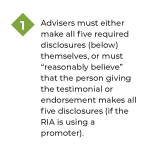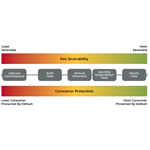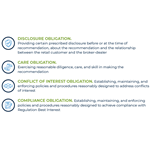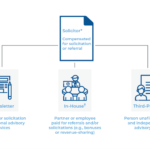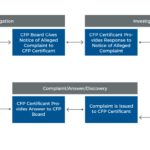There is a fundamental difference between hiring an advisor and hiring a salesperson. As while both have essential roles in the economy – sometimes we want the advice of a nutritionist about our red meat intake, and other times we simply want the butcher to sell us the best cut of meat – regulation has long recognized the importance of “truth in advertising” when it comes to those respective roles. Simply put, it’s important for advisors to communicate that they’re advisors and for salespeople to communicate that they’re salespeople (and not advisors), lest the consumer receive conflicted advice from a salesperson who isn’t actually trying to advise but simply wants to sell their product. Thus why nutritionists are subject to different rules than butchers, why doctors are regulated in a distinct manner from the drug industry, and why investment advisers are regulated in a different manner than brokers.
In fact, the entire genesis of the Investment Advisers Act – that forms the foundation for the fiduciary regulation of investment advice – was a stated intention by Congress to separate the “bona fide investment counselor” from the “tipsters and touts” looking to sell brokerage products under the guise of advice. Which, notably, didn’t mean limiting broker-dealers from engaging in the sales activities of brokering and dealing – which are foundational to the operation of the stock market and the function of capital formation in public markets – but instead was about separating the activities of advisors and brokers, by applying separate registration requirements for investment advisers, and higher (fiduciary) standards of conduct for those who registered as such.
To maintain this distinction, Congress also included in the Advisers Act under Section 208(c) a requirement that it wasn’t even permissible to use the “investment counselor” title, or to “represent as an investment counsel”, without actually being principally in the business of providing such advice services (and subject to the fiduciary standard that would apply to such advice). In other words, advisors weren’t permitted to advertise that they were advisors unless they agreed to be regulated as (fiduciary) advisors.
Yet in the 80 years since, the titles used to convey advice services have changed substantially, from what was once a relatively ubiquitous title of “investment counselor” to the more modern versions “financial advisor” or “financial consultant” or “wealth manager”. Notably, though, Section 208(c) of the Advisers Act regulates not just the title of “investment counselor”, but also the function of providing “investment counsel” services… which is just as relevant today as it was 80 years ago. Even though, in practice, the SEC does not regulate “financial advisor” titles today the way it regulated “investment counselor” decades ago.
At the same time, the growth of financial planning as a distinct profession alongside investment advice has created new regulatory challenges. In 2005, the SEC recognized this by declaring, similar to Section 208(c) for investment counsel, that those who either hold out as a “financial planner”, offer financial planning services, or deliver a financial plan to the client, cannot operate as brokers and must be regulated as fiduciary investment advisers. Yet when the 2005 rule was subsequently vacated by the Courts – for reasons unrelated to the regulation of financial planners – the SEC stated in a 2007 Proposed Rule that it would ‘soon’ revisit the regulation of financial planning. But 14 years later, the 2007 Proposed Rule is still just proposed.
Accordingly, this week XY Planning Network is filing a series of two Petitions for Rulemaking to the SEC, to take up again the 2007 Proposed Rule and its consideration of whether financial planning titles and services should automatically trigger fiduciary investment adviser registration, and to modernize Section 208(c) of the Advisers Act and better define in today’s environment what constitutes “investment counsel” services that would necessitate not just registration as an investment adviser but a requirement to principally be in the business of advice in order to market one’s services as such.
Because in the end, there remains an essential role for both advice and sales, and consumers should have the choice about whether to engage a salesperson to implement a desired purchase, or an advisor to help them select the right purchase to implement in the first place. But regulation of advice and sales begins with a fundamental truth-in-advertising obligation that advisors and salespeople advertise as such, so the end client understands the nature of the relationship that they are engaging to begin with. And so as the offering of financial advice services evolves, along with the marketing and other titles used to convey such services… it’s time for regulation to evolve with the times as well!


